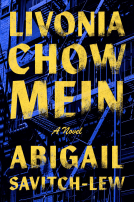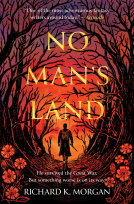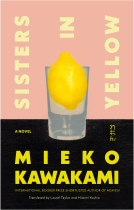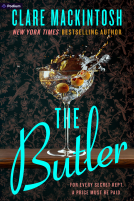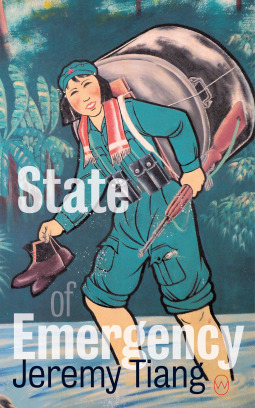
State of Emergency
by Jeremy Tiang
This title was previously available on NetGalley and is now archived.
Send NetGalley books directly to your Kindle or Kindle app
1
To read on a Kindle or Kindle app, please add kindle@netgalley.com as an approved email address to receive files in your Amazon account. Click here for step-by-step instructions.
2
Also find your Kindle email address within your Amazon account, and enter it here.
Pub Date Jun 03 2025 | Archive Date Jun 03 2025
Talking about this book? Use #StateofEmergency #NetGalley. More hashtag tips!
Description
"State of Emergency is a compelling, important piece of work from one of Singapore’s finest living authors.” —The Straits Times
Siew Li leaves her husband and young children to fight for freedom in the jungles of Malaya. Decades later, a Malaysian journalist returns to her homeland to uncover the truth of a massacre committed during the Emergency, while Siew Li’s son uncovers the truth of his family’s past. Informed by years of painstaking research, Jeremy Tiang’s debut novel dives into the tumultuous days of leftist movements and political detentions in Singapore and Malaysia. It follows an extended family from the 1940s to the present day as they navigate the choppy political currents of the region. State of Emergency questions whether we can grasp the truth after the fact. And yet, in the very telling of its interlocking stories, it reaffirms the importance of trying.
Advance Praise
- Shortlisted for the NUS Singapore History Prize 2021
- Winner of the Singapore Literature Prize 2018, Fiction
- Shortlisted for the Singapore Book Awards 2018, Best Fiction Title
- Finalist for the Epigram Books Fiction Prize 2016
- “Masterfully written. Tiang has that rare talent for capturing some of the more unpleasant, eminently relatable aspects of Singapore society—from pious bureaucrats to sadistic authority figures—without cloying his art with sentimentalism or bitterness. State of Emergency is a compelling, important piece of work from one of Singapore’s finest living authors.” —The Straits Times
- “Each of State of Emergency’s six sections, focusing on one character and period at a time, is gripping and powerfully emotive. All Tiang’s characters are well-realised, vulnerable, conflicted and forced to bear the burden of guilt for things which are beyond their control. The scars left on the extended Low family, split apart in so many ways and denied the chance to live normally together, mirror the scars etched deeply into a nation.” —The Herald
- “Informed by years of painstaking research and brought to life with naturalistic, context-sensitive dialogue, Tiang’s characters speak not only with the authority, but also the tenderness, of truth. State of Emergency speaks as much to a world rocked by division and inequality as a country grappling with its own biography. It persuades us that there is always another layer to the truth, that one’s security and prosperity is ever, for another, a perpetual and bruising state of emergency.” —Asian Review of Books
- “State of Emergency boldly takes on periods in Singapore’s history that many people would prefer not to face. To what degree citizens are culpable in what they have done and what they have failed to do at the worst moments of their nation’s history: this is the vital and uneasy question the novel impresses upon its readers.” —Singapore Unbound
- “Epic in scope, yet so intimate in its depiction of the characters. Tiang is a brilliant writer.” —KENNY CHAN, Chief Judge, Singapore Literature Prize 2018 (English Fiction)
- “A superbly structured piece of work. The sweep of the dramatic narrative is impressive, with just the right dose of intrigue and mystery.” —HARESH SHARMA, Resident Playwright, The Necessary Stage
- “A well-written novel, and it has a wide historical perspective.” —PHILIP HOLDEN, author of Heaven Has Eyes
Marketing Plan
- Advance galleys and digital reader copies
- Digital assets including trailer and author video
- Signed book plates available
- National TV, radio, print, and online review campaign
- Consumer-facing national advertising campaign on Shelf Awareness, Lithub, NPR, Foreword Reviews, Goodreads
- Virtual or in-person author events
- Book club discussion guide
- Bookstore co-op available
- Excerpt placement
- Social-media campaign and Goodreads Giveaway
Available Editions
| EDITION | Other Format |
| ISBN | 9781642861549 |
| PRICE | $19.99 (USD) |
| PAGES | 302 |
Links
Available on NetGalley
Average rating from 24 members
Featured Reviews
 Reviewer 1580019
Reviewer 1580019
This was my first foray into Malaysian and Singaporean history and literature, and State of Emergency left a profound impression. It’s a stunning book that cleverly weaves together the lives of its characters across intersecting timelines and connections, offering a nuanced portrait of a tumultuous period in history.
The book is largely narrative-driven, with minimal dialogue—a feature I didn’t consciously notice until another review pointed it out. On reflection, I realized how well this choice serves the story and its characters. The narration, intertwined with the characters’ inner thoughts, mirrors their situations perfectly.
For instance, Jason spends much of the novel in solitude, contemplating his life and grieving lost loved ones. The absence of dialogue amplifies his isolation. Similarly, Siew Li’s involvement in covert communist activities forces her to carefully guard her words and thoughts, underscoring the pervasive atmosphere of suspicion and danger. In this way, the scarcity of dialogue becomes a strength, immersing the reader in the characters’ realities.
Tiang’s writing is masterful, balancing character development and plot with rich historical context and atmosphere. State of Emergency is both a deeply personal and broadly resonant story, shedding light on a complex history while delving into themes of loyalty, identity, and sacrifice.
Overall, this is a beautifully written and thought-provoking novel that I highly recommend to anyone interested in history, literature, or simply a well-told story.
 Jill B, Reviewer
Jill B, Reviewer
A complicated and thought provoking tale of protest and politics in Singapore and Malaysia in the 20th century. This book focuses on a young girl who becomes involved in the political turmoil at the expense of her personal and family life showing the wider impact on those around her.
 Account D, Reviewer
Account D, Reviewer
State of Emergency is the story of a turbulent era of Asian history that led to the formation of Malaysia and the city state of Singapore up until the present day.
Told through the stories of one extended family Jeremy Tiangs excellent book begins with Siew Li leaving her husband and children to fight with insurgents in the jungles of colonial-era Malaya with the ramifications of her decision passing down through the generations.
As well as a fantastic story the book gives an insight into a part of colonial history Britain has been in denial about ever since and societal and political realities that lurk beneath the surface of the bright lights and conspicuous wealth of Singapore.
The writing is powerful and shocking events are depicted very effectively without melodrama, making their descriptions more hard-hitting, the banality of evil , a society where exploitation and racism is ingrained and dictatorship posing as democracy.
As a frequent visitor to this part of Asia I was fascinated and had my eyes-opened to a past not taught in local schools and ,sadly typically, yet more evidence of the reality of Britain's colonial past.
When you finish a book and you're still thinking about it for days afterwards you know the author has done a great job and I spent hours on finishing this looking further into the events ,places and "real life" people that Jeremy Tiang has woven his story around.
 Emma K, Reviewer
Emma K, Reviewer
This novel follows a family deeply affected by politics in Singapore over the post-independence period. It’s deeply researched and the author clearly cares a lot about this topic - according to the introduction this history is still not well known in Singapore today.
The first chapter of this book is terrible, the rest is pretty good. Each chapter follows a different character - the first one is pretty unsympathetic and you can tell from the writing the author doesn’t like this character either. I almost quit reading.
The rest of the chapters are much more interesting. It’s best to treat this book as historical first and novel second - the character work and plot, while not bad, are also clearly not the purpose of this work. I did learn something and was excited about reading this book, and I wouldn’t have read a nonfiction book even though a lot of my outstanding questions would have been answered by nonfic.
I’d recommend “Home” by Leila S Chudori for a southeast Asian political novel that is more serious about the novel part. This is still worth a read if you’re interested in Singaporean history.
 Reviewer 1565245
Reviewer 1565245
State of Emergency is an important and compelling novel about a period of time that I was previously completely ignorant about. Even though it is fiction, there were many references to real events. I was able to educate myself and do some research.
By the end of the book, the story arc comes full circle. I found this to be a skilful end to a story that spans decades. The use of a different narrator for each chapter was interesting, as it meant that the Emergency and its repercussions could be examined from multiple angles. I enjoyed each of these chapters equally as I learned something new from each viewpoint. The characterisation was also great as each narrator felt distinct in their own voice.
I liked the overall vibe of the prose, too. In quieter moments, the descriptions of places and foods were vivid. I could imagine the different locations while reading, which made me feel rooted in the story. I could tell that Jeremy Tiang put a lot of care and research into this book. This was an emotional read, with a strong emphasis on the interconnecting repercussions of tragedy.
Jeremy Tiang's debut novel, State of Emergency, takes readers on an unforgettable journey through a turbulent period in Southeast Asia’s history. The story spans decades, exploring the violent political struggles in Singapore and Malaysia during the mid-20th century, with a particular focus on the Emergency – a period of conflict and political turmoil in British-occupied Malaya.
The novel begins in Tiong Bahru, where Siew Li, a mother and wife, leaves her family behind to join the fight for freedom in the jungles of Malaya. Years later, the narrative shifts to a Malaysian journalist who returns to uncover the truth about a massacre committed during this time, while in Singapore, Siew Li's niece, Stella, is accused of being a Marxist conspirator.
Through these characters and multiple other narrators, Tiang reveals the deep political and social divides that characterised this violent era. Each perspective offers a different viewpoint on the events, pulling readers into a world of love, violence, family, and political strife. The interconnected lives of these characters serve to highlight how the very things that divide us can also be the threads that bind us together.
Tiang’s writing is both poignant and insightful, leading readers through this little-known chapter of history with nuance and depth. His portrayal of the struggles of individuals and families caught in the crossfire of political unrest makes State of Emergency a deeply moving and powerful read. This is a novel that educates, informs, and draws readers in with its engaging story and rich historical context.
If you’re looking for a novel that explores the complexities of political and familial ties against the backdrop of an intense historical moment, State of Emergency is an absolute must-read. It’s a book that’ll stay with you long after the final page.
Read more at The Secret Book Review.
Why has this book taken so long to get to the US? It is an outstanding novel that melds Singaporean and Malaysian history with the story of a family and with distinct characters finding their way in an uncertain world. I loved it. The storytelling is so powerfully accomplished with hardly any dialogue through six connected sections introducing us to six characters. It is so cleverly done and treats the reader as an intelligent being who can see the connections without being told every one. I devoured this book in two days and the bonus for me was the education on the perspectives and politics surrounding the State of Emergency and what happened after the British pulled out. I enjoy learning tangentially to easy reading and this novel was one big history lesson. It was occurring aways in the background of the characters making their choices as to how to live their lives and then living with the consequences. My favorite part was the last section. There was such a wonderful feeling of coming full circle without it being a typical happy ending. I will read anything this author writes and I’m so thankful to NetGalley, Jeremy TIang and World Editions for introducing this work to me.
 Des C, Reviewer
Des C, Reviewer
Lee Kuan Yew, Singapore's founding father and long serving first Prime Minister famously said "I’ve spent a whole lifetime building this. And as long as I'm in charge, nobody's going to knock it down". He certainly meant it. In 'State of Emergency' Jeremy Tiang's fictionalised account of those early turbulent times in Singapore it comes across very clearly just how ruthless Lee's Singapore government was in stamping out any and all dissent and the impact of that policy on families. Tiang does a wonderful job of recreating a history that is both largely unknown and so very recent. I enjoyed this book so much I immediately watched the film "To Singapore, With Love" by Tan Pin Pin, which Tiang recommends in the credits at the end of his book. Highly recommended. Special thank you to NetGalley for a no obligation digital advance review copy.
 Calzean J, Reviewer
Calzean J, Reviewer
A fascinating book on the early days of Malaya, Malaysia and Singapore, the various Government's obsession to remove all Communists and the impact on those who by choice or chance become or are labelled Communists. It seems anyone who opposes the Government is a Communist.
Each chapter follows one character and follows chronologically.
Some of the things covered. Young school girls arrested for protesting. Held for months with no charge or trial. A massacre of villagers. Villages surrounded by barbed wire. Anti-Chinese sentiments.
Then there is the chapter on Stella. Arrested for being involved in a Church Group helping less fortunates. Her interrogators were so absurd they were frightening, her confusion unmistaken and the writing in this chapter is the highlight of the book.
 Reviewer 1730437
Reviewer 1730437
I remember in my younger days clinging to a statue to avoid charging horses. I remember the electricity in the air as hundreds of students gathered at Milbank. The terrifying sound of an extinguisher hitting the ground. The charged atmosphere of a kettle, and the sight of batons and visors. I was so sure of my political thoughts. I was proselytizing the good word of socialism. I look back at my past self and cringe somewhat at the earnestness of my convictions. I still believe in it, but perhaps my youthful optimism (naivety) has been faded like a worn, but loved photo.
.
In a way this book is a combination of faded memories and youthful optimism for a brighter future. A brighter future out of the ruins of war and colonization. A future filled with equality and utopian desires. All this seems to fizzle when it comes in to contact with the reality. The gleaming towers and the pristine streets of Singapore came at a cost to those who saw things differently. The idealism on display with hindsight seems naive and futile, but in a way I can see where that hope comes from.
.
This is an expansive and at times taut novel that overlays the emergence of Singapore and Malaysia onto the lives of a family and a handful of people. The ideals of political thought, the hope for a more democratic existence and politics of race and religion.
.
The book takes an individual look at people who are connected and affected by the state of emergency. Even with my very scant knowledge of the area and the particular history I was immediately enveloped in a sense of humid tension, of loss, of melancholy and of injustice.
.
I enjoyed reading this more than I had expected to, although not perfect (see comments) it had enough to keep me going to the end.
 Dmitry P, Reviewer
Dmitry P, Reviewer
The story of the Communist rebel movement in Malaya (and, subsequently, Singapore), told through the experience of a few people who participated or were affected by the events surrounding this movement's actions, over the decades since its inception until very recently. The story exposes some of the structural injustice that caused the emergence of this movement, the dictatorial and strong-armed tactics employed by the Singaporean government, and the culture of fear and silence surrounding the events. In this sense, the book is exemplary - it exposes parts of history that I knew nothing about, and shows a chapter of Singaporean history that deserves to be heard and debated.
The book also happens to be extremely well written, almost like a spy novel. The action is omnipresent and the reader can't avoid being swept by the current of events and emotions underpinning the novel. The injustice experienced by the protagonists is infuriating, and almost feels real. The realistic portrayal of its effects makes it doubly powerful - there are rarely (if any) heroes. It's mostly suffering and acquiescence that are the result of the decade-long struggle.
The only aspect of the book I found lacking was the character development. The author is clearly a talteller, and the emotion underpinning his writing is paramount. However, the protagonists emerge as almost one-dimensional, whose reservedness and sense of duty (in their differing manifestations) seem to be the defining characteristics, barring all else.
Recommend to anyone interested in South East Asian history, and specifically that of Singapore - a topic that is rarely discussed in any way but with admiration.
My thanks to Netgalley and the publisher for providing me with an early copy of this book in return for an honest review.
 J. K, Reviewer
J. K, Reviewer
Thanks to the publisher and Netgalley for this eARC.
Jeremy Tiang’s "State of Emergency" is a masterful tapestry of history, politics, and personal struggle, woven through the lives of individuals caught in the turbulence of Singapore and Malaysia’s leftist movements. This novel does not merely recount history—it immerses the reader in the emotional and ideological battles of those who lived through it.
Tiang’s storytelling is both intimate and expansive. He crafts a multi-generational narrative that follows characters whose lives intersect with key moments of political upheaval, from the Malayan Emergency to Singapore’s authoritarian crackdowns. The novel’s structure—shifting perspectives and timelines—mirrors the fragmented nature of historical memory, forcing the reader to piece together the truth just as the characters do.
What makes "State of Emergency" compelling is its refusal to simplify history into heroes and villains. Instead, Tiang presents a nuanced exploration of ideology, survival, and the cost of resistance. His prose is understated yet powerful, allowing the weight of events to settle naturally rather than through overt dramatization. The novel’s emotional core lies in its characters—ordinary people forced to make extraordinary decisions, often at great personal cost.
For readers interested in historical fiction that challenges conventional narratives, "State of Emergency" is a must-read. It is a story that lingers, urging reflection on the ways history is shaped, remembered, and sometimes erased. Tiang’s work is a quiet but forceful reckoning with the past, and its relevance extends far beyond the borders of Singapore and Malaysia.
 Chris Y, Reviewer
Chris Y, Reviewer
State of Emergency by Jeremy Tiang is a poignant and intricately layered novel that traces the effects of political upheaval across generations in Singapore and Malaysia. Through interlinked narratives, Tiang explores themes of resistance, memory, and the personal costs of state repression. It's a powerful work that brings hidden histories to light from the greatest working literary translator.










